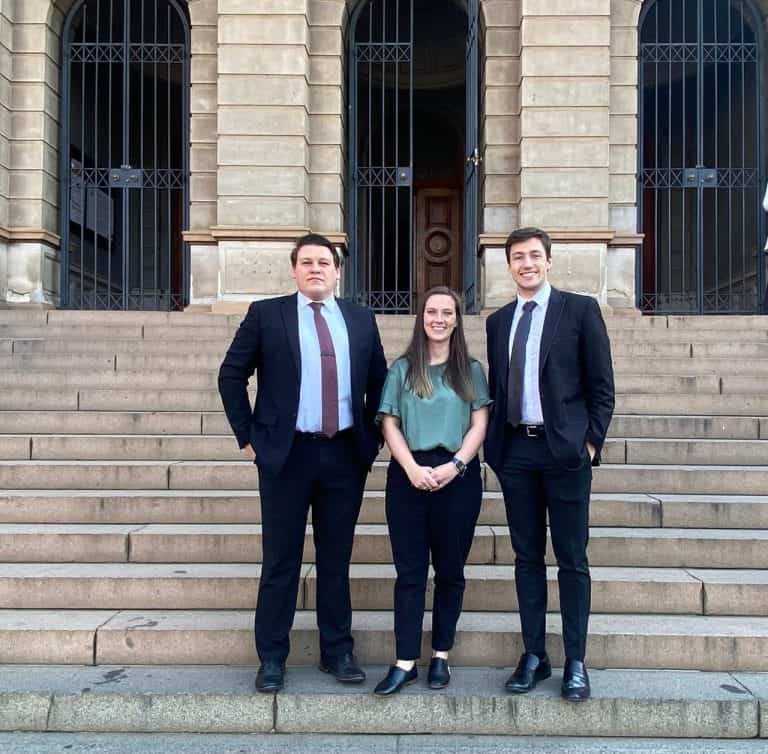 AfriForum’s legal team from left to right are Arno Roodt (AfriForum District Coordinator for the Greater Pretoria South region), Deidré Steffens (AfriForum’s Advisor for Local Government Affairs) and Carl Meyer (attorney for HurterSpies) photo supplied
AfriForum’s legal team from left to right are Arno Roodt (AfriForum District Coordinator for the Greater Pretoria South region), Deidré Steffens (AfriForum’s Advisor for Local Government Affairs) and Carl Meyer (attorney for HurterSpies) photo supplied
By Deidré Steffens
Advisor Local Government Affairs AfriForum
Judgment has been reserved today in AfriForum’s legal battle against the Tshwane Metropolitan Municipality regarding the implementation of the metro’s controversial city cleansing levy.
The case was heard yesterday and today in the High Court in Pretoria.
AfriForum approached the court to overturn the metro’s decision to impose this new mandatory monthly levy of R194,37 (excluding VAT) on nearly 260 000 households and businesses in the metro.
The civil rights organisation maintains that the levy amounts to unfair double taxation, particularly in cases where residents do not benefit from the metro’s refuse removal services and are forced to make use of private service providers.
Last week, the civil rights organisation denounced the metro’s actions after it came to light that the levy was already added to residents’ latest municipal bills, despite civil society’s strong opposition to it and AfriForum’s pending court case.
Meanwhile, the metro has tried to defend the implementation of the levy and now argues that the levy has its origins in the metro’s 2016 tariff policy.
However, this policy was not filed with the metro’s court documents as they themselves were unable to locate the document which the metro described as a “critical document” for the case.
The metro ultimately closed its case without using the policy in its arguments.
AfriForum’s legal team criticised the metro for this administrative blunder and maintains that insufficient access to important municipal documents such as bylaws and policies highlights the metro’s lack of transparency.
During the past two days of court proceedings, AfriForum also questioned the metro’s argument that it has the necessary equipment and personnel to provide adequate refuse removal throughout Tshwane.
According to AfriForum, this claim stands in direct contradiction to residents’ day-to-day experiences in this regard.
The metro’s argument regarding its ability to deliver the service also contradicts an official report that the Tshwane Metro released just last week and was approved by the council.
Although AfriForum did not use the report as part of its case in court, it paints a bleak picture of the metro’s waste management failures.
It states, among other things, that the metro “currently [has] a very weak organisational capacity for the waste management function”.
“According to the report, it was estimated last year that in the previous five years, the metro’s landfill sites had suffered a total loss of R148 million in income.
The report makes several recommendations to address the problems, including the repair of weighbridges and the improvement of security at landfill sites.
These interventions are not only overdue but also highlight the chronic mismanagement and neglect that plague the metro’s waste management services,” said Arno Roodt, AfriForum’s Regional Coordinator for Greater Pretoria South.
AfriForum stresses that the metro seriously lacks a coherent institutional mechanism for the effective delivery of solid waste management services.
It also does not have a well-structured and guided strategy as required by Section 78 of the Municipal Systems Act. According to AfriForum, this legislation prescribes critical processes to ensure that municipalities determine the most appropriate means for the effective and sustainable delivery of services.
“The metro claims in its court documents that it is fully capable of delivering the services in question, yet the facts reveal a completely different reality,” explains Deidré Steffens, AfriForum’s Advisor for Local Government Affairs.
“We’re dealing here with a metro that has not only allowed landfill operations to bleed millions of rand but has also failed to establish a basic service delivery framework as required by law.
Now the metro seeks to penalise residents by imposing an arbitrary levy on services that are either non-existent or in disrepair.”
Roodt emphasises that the “so-called city cleansing levy is not based on service usage, as is required by law.
This levy is a fundraising tool aimed at covering up years of poor planning and financial mismanagement.”
Tshwane Talks readers have been able to read stories in this publication for free for over two years now. We still want our readers to access our stories for free, but we are asking those among our readers who can afford it to contribute at least R30 a month to cover some of the costs of publishing this independent, non-aligned online newspaper which gives a voice to all sectors of society irrespective of race, colour, creed, religion, or political affiliation. You may make your contribution by depositing at least R30 a month into Tshwane Talks' bank account. Details are as follows:
Bank Details
Bank: Standard Bank
Account Number: 10225548834
Account Type: Cheque Account